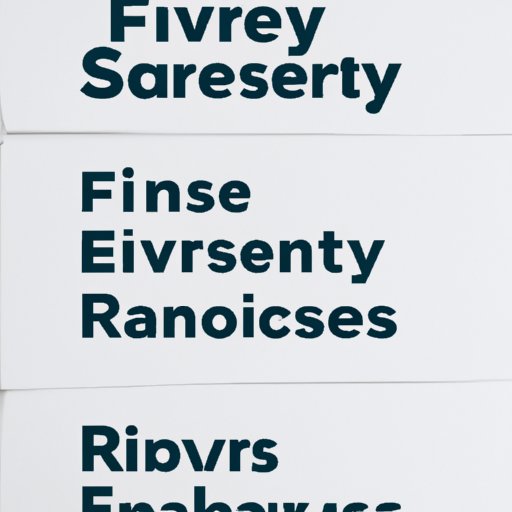Introduction
A career in finance can be incredibly rewarding, but getting your foot in the door can be difficult. An entry level finance job is the first step towards a successful and lucrative career in the finance industry. But what exactly is an entry level finance job?
An entry level finance job is a position that requires little to no experience or knowledge of the finance industry. These jobs are typically lower paid than more experienced positions, but they offer valuable training and experience that can help you move up the ladder in the finance industry.
This article will provide an overview of how to get an entry level finance job. We’ll look at different types of jobs available, how to network with professionals in the field, ways to obtain relevant certifications and qualifications, and tips for crafting a professional resume and cover letter. Finally, we’ll discuss how to apply for entry level finance jobs.

Research Types of Entry Level Finance Jobs
The first step towards getting an entry level finance job is to research the different types of jobs available. There are many areas of focus within the finance industry, such as banking, accounting, investments, and financial planning. Identifying which area interests you most is key to finding the right job for you.
Once you’ve identified an area of focus, it’s time to learn about the different roles and job requirements within that area. Do some research into the type of job you’re looking for, and make sure you have the necessary skills and qualifications before you start applying. It’s also important to understand the salary range for the job you’re interested in so you can set realistic expectations for yourself.

Networking with Professionals in the Finance Industry
Networking is one of the best ways to get an entry level finance job. Attending professional conferences and events related to the finance industry is a great way to meet potential employers and learn more about the industry. You can also reach out to connections and mentors who work in the finance industry and ask them for advice or to introduce you to potential employers.
Networking also offers the opportunity to practice your interview skills and demonstrate your interest in the field. Many employers value enthusiasm and dedication, so take the time to show your genuine interest in the finance industry and the role you’re applying for.
Obtaining Relevant Certifications and Qualifications
In order to be competitive in the finance industry, it’s important to obtain relevant certifications and qualifications. Depending on the type of job you’re interested in, there may be specific certifications or qualifications that you need to hold in order to be considered for the role. Research and choose appropriate certifications and qualifications that will give you an advantage over other applicants.
You can also take courses or training programs to gain the necessary skills and knowledge for an entry level finance job. These courses and programs can provide invaluable insight into the finance industry and help you stand out from the competition.
Creating a Professional Resume and Cover Letter
When applying for entry level finance jobs, it’s important to create a professional resume and cover letter. Your resume should highlight any relevant experience and skills you have, as well as any certifications or qualifications you’ve obtained. Use professional language and formatting to make your resume and cover letter stand out.
Your cover letter should explain why you’re interested in the role and why you’d be a good fit for the company. Demonstrate your enthusiasm for the role and explain why you’re the best candidate for the job. This is your chance to make a good impression on potential employers, so take the time to craft a compelling and interesting cover letter.

Applying for Entry Level Finance Jobs
Once you’ve done your research, networked with professionals in the finance industry, and created a professional resume and cover letter, it’s time to start applying for entry level finance jobs. Utilize online job boards and other recruitment sites to find suitable openings. Make sure to tailor your applications to each role and follow up on any applications or interviews.
Conclusion
Getting an entry level finance job is the first step towards a successful and lucrative career in the finance industry. Research different types of entry level finance jobs, network with professionals in the industry, obtain relevant certifications and qualifications, create a professional resume and cover letter, and apply for positions. With the right preparation and perseverance, you can land the perfect entry level finance job.
For additional resources and support, consider joining a professional organization related to the finance industry. These organizations often offer mentorship programs, networking opportunities, and access to job postings. Additionally, researching and reading books, blogs, and articles written by experienced professionals in the finance industry can be a great way to stay informed and inspired.
(Note: Is this article not meeting your expectations? Do you have knowledge or insights to share? Unlock new opportunities and expand your reach by joining our authors team. Click Registration to join us and share your expertise with our readers.)
